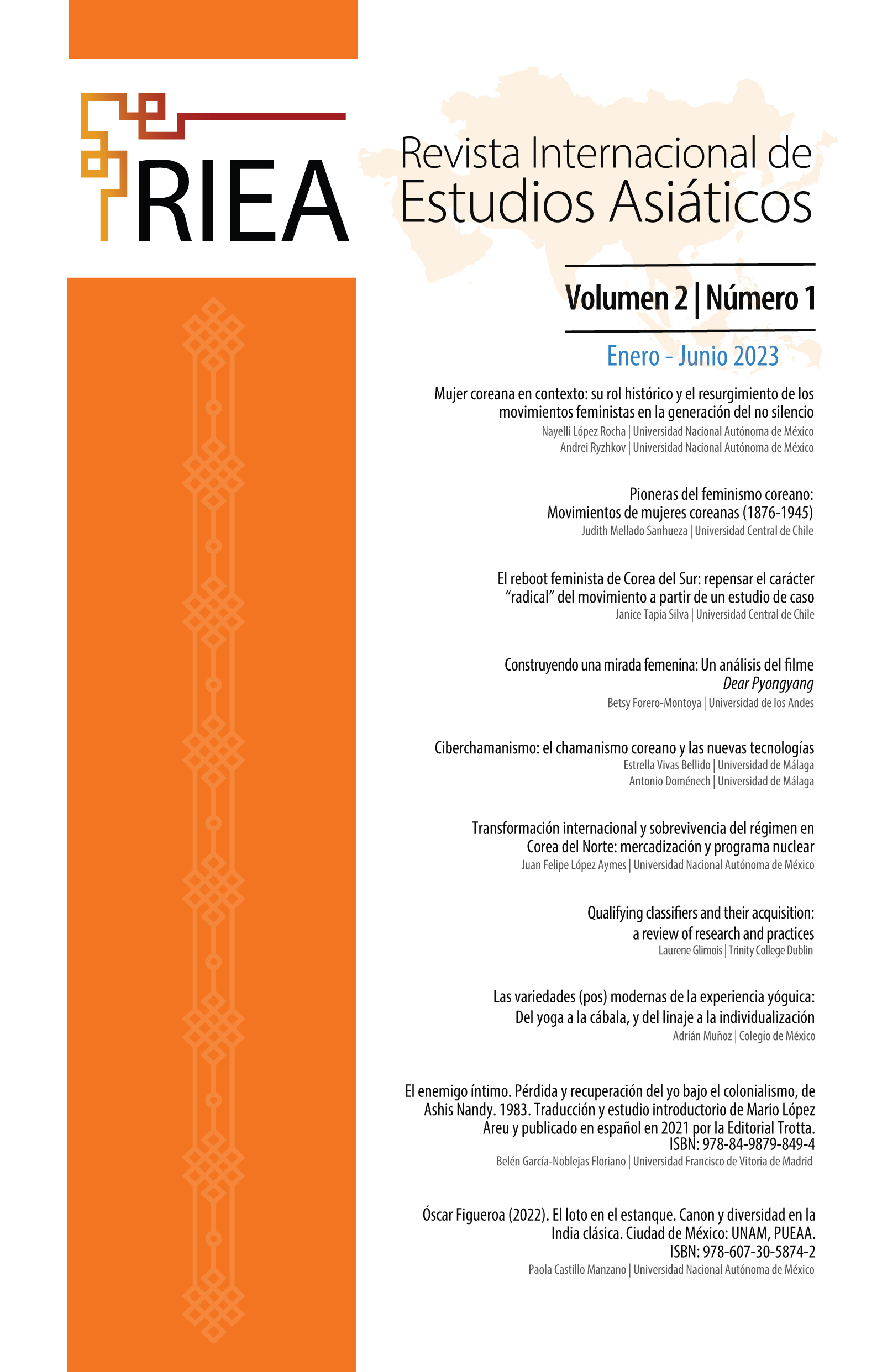Abstract
The concept of contemporary Korean women is a big question mark for other societies. The images projected by cultural industry in full swing worldwide, contrast strongly with the experiences that are lived by women in the Asian country in focus. Confronted with the Confucianism heritage that permeates society, Korean women are at a generational crossroads. The youngest, having accessed education that provided them with tools to question the social system, shake the mandates historically inherited by a socially reproduced gender system. With the technologization and global information flows, local mindset is confronted with other realities, allowing the young women to position their collective vision, questioning the patriarchal and anthropocentric system reflected in the State itself. To meet social demands and guarantee the security, development and participation of women, the State must appeal to an equitable system without infringing them in a society that is self-cataloged as democratic.
References
CedarBough, T. Saeji. “The Seungri Scandal and South Korea’s Gender Disparity”. Korea Exposé (13 de abril de 2019). https://www.koreaexpose.com/what-seungri-burning-sun-scandal-says-about-korea-gender-disparity/.
Ching, Miriam y Yoon, Louie. “Minjung feminist: Korean women's movement for gender and class liberation”. Women's Studies International Forum 18, núm. 4 (1995): 417–430. doi:10.1016/0277-5395(95)80033-L.
Chung, E. “Modern Korean Women and Confucian Values: Change and Assimilation” [en línea]. Academy of Korean Studies (2015), http://cefia.aks.ac.kr:84/index.php?title=Korean_Confucianism_-_8._Modern_Korean_Women_and_Confucian_Values:_Change_and_Assimilation.
Deuchler, Martina. The Confucian Transformation of Korea: A Study of Society and Ideology. Cambridge (Massachusetts); London: Harvard University Asia Center, 1992.
FAO. Republic of Korea en Base de Datos de Género y derecho a la Tierra [en línea]. FAO (2021). http://www.fao.org/gender-landrights-database/country-profiles/countries-list/land-tenure-and-related-institutions/en/?country_iso3=KOR
Han, Ju Hui Judy, y Jennifer Jihye Chun. “Introduction: Gender and Politics in Contemporary Korea”. The Journal of Korean Studies 19, núm. 2 (2014): 245-255.
Hur, Song-Woo. “Mapping South Korean Women’s Movements During and After Democratization: Shifting Identities”. En East Asian Social Movements, editado por Broadbent, Jeffrey y Brockman, Vicky: 181-203. Springer, 2011.
Hwang, Kyung Moon. A History of Korea. England: Palgrave Macmillan, 2010.
Ilyon. Samguk Yusa: Legends and History of the Three Kingdoms of Ancient Korea, traducido por Tae-Hung Ha y Grafton Mintz. Seúl: Silk Pagoda, 2006.
Korea Exposé. Feminism Reboot [en línea]. Korea Exposé (2018). https://www.youtube.com/watch?v=2EMRJzDMXdg&feature=youtu.be
KOSTAT. 2019 Population and Housing Census (Register-based Census) en Korea Statistics [en línea]. KOSTAT (2020). http://kostat.go.kr/portal/eng/pressReleases/8/7/index.board
KOSTAT. Women's Lives through Statistics in 2020 en Korea Statistics [en línea]. KOSTAT (2020). http://kostat.go.kr/portal/eng/pressReleases/1/index.board?bmode=read&aSeq=385880.
Kwon, Hee Young. “From Sinocentrism to Civilization Discourse”. The Review of Korean Studies 13, núm. 3, (2010): 13-30.
Lee, Bae-Yong. Women in Korean History, traducido por Kyong-hee Lee. Seúl: Ewha Womans University Press, 2008.
Lee, Yeji. “Megalia: South Korea’s Radical Feminist Community” [en línea]. 10 Magazine (2 de agosto de 2016). https://10mag.com/megalia-south-koreas-radical-feminism-community/
Lopez Rocha, Nayelli, y Andrii Ryzhkov. “Hallyu, The Current Issues of its development and Dissemination Process in México”. Journal of Korean Culture 26 (2014): 119-148. https://www.kci.go.kr/kciportal/ci/sereArticleSearch/ciSereArtiView.kci?sereArticleSearchBean.artiId=ART001878585
López Rocha, Nayelli y Andrii Ryzhkov. “Alcances de la Política Cultural de la República de Corea en la Diáspora Coreana de la Ciudad de México en la Primera Década del Siglo XXI”. Journal of Korean Culture 47 (2019): 203-236. https://www.kci.go.kr/kciportal/ci/sereArticleSearch/ciSereArtiView.kci?sereArticleSearchBean.artiId=ART002527965
MOGEF. Gender Equality Policy en Major Statistics of MOGEF Statistics Relating to Women [en línea] MOGEF (2021a). http://www.mogef.go.kr/eng/lw/eng_lw_f002.do
MOGEF. Gender Equality Policy en Major Statistics of MOGEF Statistics Relating to Women [on line]. MOGEF (2021b) http://www.mogef.go.kr/eng/pc/eng_pc_f001.do
Museo Nacional de Historia Contemporánea de Corea. “Desire for democracy, the spread of the democratization movement” [en línea]. Democracy in South Korea (S.f.). https://www.much.go.kr/en/contents.do?fid=03&cid=03_9
Naciones Unidas. Igualdad de género: Por qué es importante [en línea]. Objetivos de Desarrollo Sostenible (2015). https://www.un.org/sustainabledevelopment/es/wpcontent/uploads/sites/3/2016/10/5_Spanish_Why_it_Matters.pdf.
Ramírez, Elaine. “South Korea finally has its first female president, but women’s groups fear she’s only made sexism worse”. Los Angeles Times (18 de noviembre de 2016) https://www.latimes.com/world/la-fg-south-korea-women-20161118-story.html
Yang, Key P., y Gregory Henderson. “An Outline History of Korean Confucianism: Part I: The Early Period and Yi Factionalism”. The Journal of Asian Studies 18, núm. 1 (1958): 81-101.

